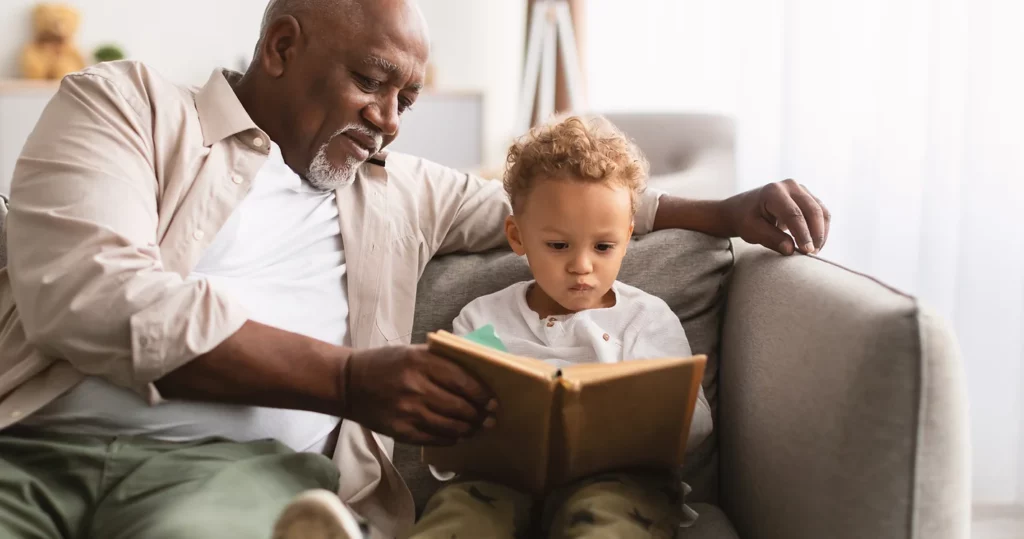
Children must learn the names and sounds of the ABCs. Once they understand the connection between letters and sounds, they can begin to combine letters to form words. This is the very foundation of reading!
Sing the alphabet song together each morning when you’re getting your child dressed. Then have them sing it while pointing at each letter of the alphabet. Play rhyming games, listen to rhyming songs, sing rhyming songs in your home language. Rhyming is an important pre-literacy skill.
The most meaningful letters to your child are the ones they see in their own name. Write their name everywhere you can, such as on their drink cups and backpacks, or put the letters of their name on the wall of their bedroom. It’s important for them to see the letters of their name written often.
Stretch your child’s vocabulary by expanding on what they say. Then add a comment or idea onto what your child say. Repeat what your child says, then add a little more description to extend type of words your child is exposed to.
For example: If your child says, “Look at my hands, Dad!”
You say: “I see you have purple jelly on of your fingers.” (Clarify and expand) “Wow, that looks sticky! (Extend)”
Point to individual letters you see on cereal boxes, signs at the store or while driving and ask them to tell you what they are. Then describe the letter shape: “That’s the letter ‘p’, it has a big line and a little curve.”
If you can sing a song or rhyme a word, you can build your child’s phonological awareness, an important pre reading skill. Children who have phonological awareness can tell you the sounds they hear in words, separate the sounds and change out sounds to make new words.
Let your child practice their uppercase, lower case, and mixed case letters in this online game from PBS.
As three year olds start speaking and develop their oral language, their words are becoming more accurate, but they may still leave off ending sounds. They are likely starting to communicate in short sentences, using 3-5 words to share their thoughts and needs. Explore and cultivate more milestones for your three year old! They might:
Enjoy both being read to and looking at books.
Can begin to recite favorite books by memory.
Start to break words into syllables (for example, clapping syllables).
Start to recognize/produce rhymes.
Pretend to read pictures, books, rhymes; point out some letters.
Practice emergent writing by scribbling or forming letters. It takes lots of practice, and it’s ok if their letters look like scribbles at first.
By the time your child is four, even strangers will be able to understand most of what they say! They will start using language to express ideas and feelings rather than just talking about the world around them. Explore and cultivate more milestones with your four year old! They might:
Enjoy both being read to and beginning to read to self or looking at the pictures and telling the story.
State first and last name and identify name in print.
Identify some upper and lower case letters including letters in their name.
Point out and say some letter names and sounds in print.
Start to recognize words with the same initial sound or the same ending sound.
When your child is five, they will be really getting into speaking! Their speech is understandable, even though they might make mistakes pronouncing long, difficult words such as “hippopotamus.” They’re probably speaking in 4 and 5-word sentences. Keep helping them reach their milestones and play with language and reading. They can:
Understands that written words are connected to sound.
Identify at least 10 letters of the alphabet.
Write first and last name and familiar words.
Say alphabet and vowels (a/e/i/o/u)
Start segmenting a word out into its individual sounds.
Practice inventive & phonetic spelling with unfamiliar words, (e.g. ”Kat” for “Cat” or “Curls” for “Colors”)
Talk, read, rhyme, and sing with your child often – in both your native language as well as other languages you know. Research from brain scientists and linguistic experts tells us that a child who learns many words in their home language will have a stronger foundation for learning a second language, like English.
Studies also show that exposing a child to two languages during their preschool years may help them learn more efficiently as they grow!
Families who talk, read, rhyme, and sing, with their children – often and in the languages they know best – will prepare them for success in preschool, elementary school, and beyond.
Free family play groups for children ages 0-5 at several locations across San Mateo County.
Start your child’s college savings account!
Get answers to your parenting questions big and small and referrals to a large network of early intervention resources available for families of children ages 0-3.